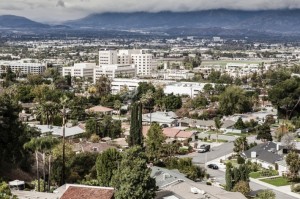9th December 2014

The headline caught my eye this morning, partly because I’m interested in the secret of a long healthy life, but also because it mentions Loma Linda, a place not too far from my family in California. This part of Southern California has been suffering from a 14 year drought and is a hot, dry dustbowl of a place: so dry that people sometimes get nose-bleeds, I’m told. And Loma Linda holds the secret to a long healthy life?
It seems so. In fact, the article says Loma Linda ‘oozes good health’. People here live up to 10 years longer than most Americans, and only develop chronic illness very late in life.
There’s an interview with a 101 year old who lives in retirement housing and lifts weight in the gym. You can see her on the website. And what she says gives a hint.
She ‘credits her long life with no drugs, going to bed early and “praising God for his goodness.”’
‘The reason for this extraordinary longevity could be rooted in their faith. ’ writes the BBC’s Peter Bowles. ‘ Seventh-day Adventists make up about half of the approximately 24,000 people who live here. It is an evangelical Christian community that follows strict guidelines about food, exercise and rest.’ And the people at Loma Linda stress the importance of a largely vegetarian diet, as well as good living habits.
‘The data is clear, the data has been published, the data has been peer reviewed,” says Dr Wayne Dysinger, chair of the preventative medicine department at Loma Linda University School of Medicine.’[i]
http://www.bbc.co.uk/news/magazine-30351406
But there used to be another community in the States where people lived to a good old age with hardly any disease. [ii] When people died in the town of Roseta in those days, it was because of old age. No heart disease, and no mention of dementia. It was so outstanding that it caught the attention of teams of different researchers who not only examined the community and their genetic inheritance, but the buildings, the soil, the diet, and even the soil and genes in the region of the country they’d originally come from, which was Italy. They also examined towns nearby, including one called Bangor that had been settled by people from Wales. None of the nearby towns had the same longevity and health in old age as the people of Roseta.
Yet the people of Roseta had a diet that would be frowned on today. They ate meat, loved butter and pasta; cooked with lard, and in short, ate a lot of fat and carbohydrates. But they had kept the family ties and the close community values they’d brought from the old country. They’d built their town on the style of the one they’d left, with houses close together, many housing three generations. At the centre of the town was the church, and their lifestyles reflected their faith.
Researchers thought that its stable structure, ‘emphasis on family cohesion, and the supportive nature of the community may have been protective against heart attacks and conducive to longevity.
And so it proved. As the younger generation grew up and went to college they returned with different values. They were to abandon their old community ways for the more typically American behaviour of neighbouring communities. Investigators predicted that the loosening of family ties and community cohesion would be accompanied by loss of relative protection of Rosetans from death due to heart attacks.
Roseta became just like all the other places. Researchers noted that ‘The social changes that occurred in Roseta in the 1960s are reflected in sharply increased rates of heart attack among men under the age of 65.’ (Incidentally, cardiovascular good health helps avoid dementia.)
Perhaps it’s more the benefits of community living combined with faith that leads to longevity in Loma Linda. They have a ‘benign social psychology,’ as Tom Kitwood might say. Tom Kitwood was clinical psychologist and Professor of Psychogerontology at Bradford University, and the trailblazer in person centred dementia care. His view was that ‘all events in human interaction – great and small – have their counterpart at a neurological level’. For example, he argued that a ‘malignant social psychology,’ that is derogatory treatment of an individual, based on stigma and ageism, has a profoundly negative effect that can lead to nerve tissue damage.’ So conversely, the opposite is true.
God designed us to live in relationship with one another. It would be ironic if we worked towards a longer life the modern way – restricting our diets, exercising regularly, practising stress busting techniques like mindfulness and meditation, when the answer is something quite simple. And Jesus said it so clearly:
‘And you shall love the Lord your God with all your heart and with all your soul and with all your mind and with all your strength.’ The second is this: ‘You shall love your neighbour as yourself.’ There is no other commandment greater than these.” Matthew 12: 30, 31.
[i] http://www.bbc.co.uk/news/magazine-30351406
[ii] The Roseta Effect: A 50-Year Comparison of Mortality Rates, Egolf et al, American Journal of Public Health, August 1992, 82:8.














